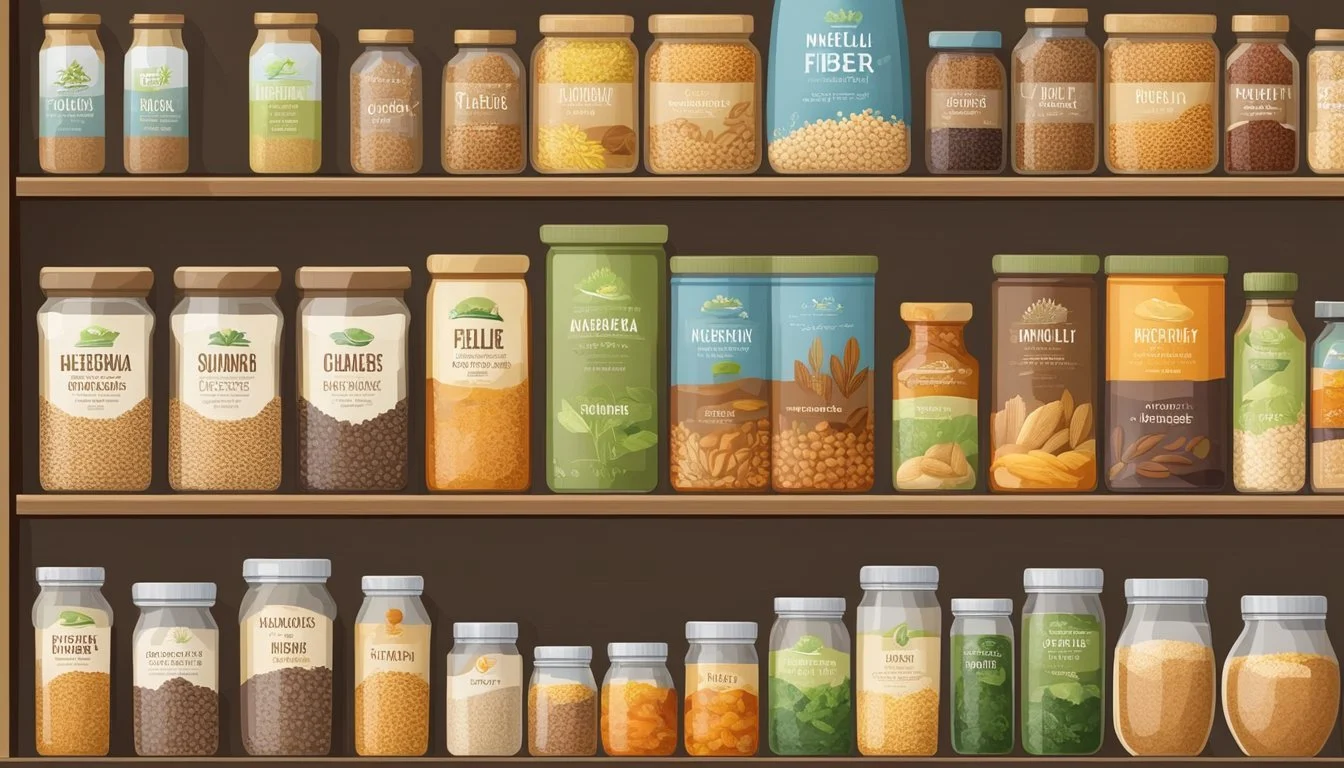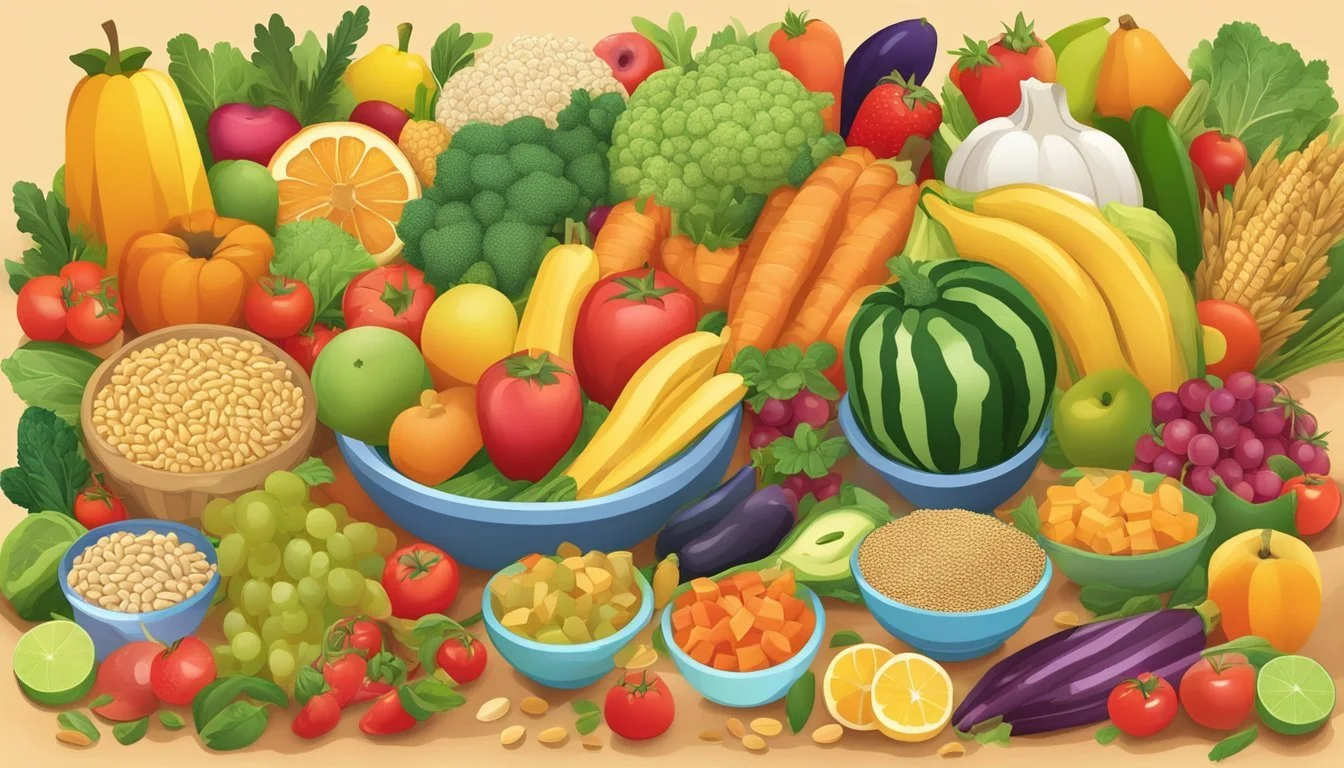Mediterranean Diet Essentials: Top Grocery Stores for Authentic Ingredients
The Mediterranean diet has gained popularity for its health benefits and delicious flavors. Finding the right grocery store to stock up on Mediterranean staples is crucial for success with this eating pattern. Trader Joe's stands out as an excellent option for Mediterranean diet shoppers, offering a wide selection of affordable and high-quality ingredients.
Mediterranean cuisine emphasizes fresh produce, whole grains, lean proteins, and heart-healthy fats. Many grocery stores now cater to this trend, but some excel in providing the necessary components. Specialty stores and larger supermarkets often have dedicated Mediterranean sections, making it easier to find items like olive oil, feta cheese, and olives.
When choosing a grocery store for Mediterranean diet shopping, consider factors such as product variety, price, and quality. Look for stores that offer fresh fish, an array of vegetables and fruits, whole grain options, and nuts and seeds. Stores with well-stocked international aisles can be particularly helpful for finding authentic Mediterranean ingredients.
Essentials of the Mediterranean Diet
The Mediterranean diet emphasizes plant-based foods, healthy fats, and lean proteins. Fruits and vegetables form the foundation, providing essential vitamins, minerals, and antioxidants.
Whole grains like quinoa, brown rice, and whole wheat bread are staples, offering fiber and complex carbohydrates. These foods help maintain steady energy levels throughout the day.
Fish, particularly fatty varieties like salmon and sardines, are key protein sources. They provide omega-3 fatty acids, which support heart and brain health.
Olive oil is the primary source of fat in the Mediterranean diet. It's rich in monounsaturated fats and antioxidants, contributing to its anti-inflammatory properties.
Other healthy fats come from nuts, seeds, and avocados. These foods offer additional protein, fiber, and beneficial nutrients.
Legumes such as lentils, chickpeas, and beans are important for their protein and fiber content. They often replace meat as the main protein source in meals.
Herbs and spices add flavor without excess sodium. Common choices include basil, oregano, garlic, and rosemary.
Moderate amounts of dairy, eggs, and poultry are included. Red meat and sweets are consumed sparingly.
A typical Mediterranean meal might include:
Grilled fish with lemon and herbs
Roasted vegetables drizzled with olive oil
Whole grain pilaf
Fresh fruit for dessert
This eating pattern promotes overall health and has been linked to reduced risks of heart disease, certain cancers, and cognitive decline.
Optimal Protein Sources
The Mediterranean diet emphasizes diverse protein sources that offer both nutritional benefits and culinary versatility. Key options include seafood, plant-based proteins, and select poultry and dairy products.
Seafood Varieties
Fish forms a cornerstone of the Mediterranean diet's protein intake. Fatty fish like salmon and tuna are particularly prized for their omega-3 fatty acids. A 3-ounce serving of salmon provides about 22 grams of protein.
Sardines, mackerel, and anchovies are other excellent choices. These smaller fish are rich in protein and heart-healthy fats.
White fish such as cod, halibut, and sea bass offer lean protein options. They're versatile for grilling, baking, or incorporating into stews.
Plant-Based Proteins
Legumes are staples in Mediterranean cuisine, offering protein and fiber. Chickpeas, lentils, and various beans are common choices.
A half-cup serving of garbanzo beans delivers around 7 grams of protein. Lentils are equally nutritious and quick-cooking.
Nuts and seeds provide protein along with healthy fats. Almonds, walnuts, and chia seeds are popular options. A quarter-cup of almonds contains about 7 grams of protein.
Whole grains like quinoa and farro contribute additional protein to the diet.
Poultry and Dairy
Chicken and turkey are lean protein sources in the Mediterranean diet. They're typically consumed in moderation.
Greek yogurt is a protein-rich dairy option. It's often preferred plain to avoid added sugars.
Cheese varieties like feta, parmesan, and ricotta feature in many Mediterranean dishes. They add flavor and protein in small amounts.
Eggs are another versatile protein source, used in various ways from breakfast dishes to salads.
Fats and Oils
Healthy fats are a cornerstone of the Mediterranean diet. Selecting the right oils and understanding their quality is crucial for maximizing nutritional benefits.
Selecting Healthy Fats
Olive oil reigns supreme in Mediterranean cuisine. Extra virgin olive oil is the top choice for its high antioxidant content and heart-healthy monounsaturated fats. Nuts and seeds provide another excellent source of healthy fats. Almonds, walnuts, and pumpkin seeds are popular options.
Avocados offer creamy, nutrient-dense fats. They're versatile for use in salads, spreads, or as a topping.
For cooking at higher temperatures, avocado oil is a good alternative to olive oil due to its higher smoke point.
Understanding Olive Oil Grades
Extra virgin olive oil is the highest quality grade. It's cold-pressed, retaining maximum flavor and nutrients. Virgin olive oil is the next best option, with slightly lower quality standards.
Regular olive oil is a blend of refined and virgin oils. It has a milder taste and fewer antioxidants than extra virgin varieties.
"Light" olive oil refers to color and flavor, not calorie content. It's highly refined and lacks the robust flavor and health benefits of extra virgin olive oil.
When shopping, look for dark glass bottles to protect the oil from light degradation. Check for harvest dates to ensure freshness.
Whole Grains and Fiber
Whole grains and fiber-rich foods form the foundation of the Mediterranean diet. These nutrient-dense ingredients provide essential vitamins, minerals, and complex carbohydrates that support overall health and wellbeing.
Integral Grains in the Diet
Whole grains like brown rice, quinoa, barley, and bulgur are staples in Mediterranean cuisine. These grains retain their bran and germ layers, offering more nutrients and fiber than refined alternatives. Brown rice provides a nutty flavor and chewy texture, perfect for pilafs and salads. Quinoa, a protein-rich pseudo-grain, cooks quickly and works well in both hot and cold dishes.
Barley adds a pleasant chewiness to soups and stews. Its high fiber content helps promote digestive health. Bulgur, a partially cooked wheat product, is commonly used in tabbouleh and other Middle Eastern dishes. It offers a quick-cooking option for busy weeknights.
Fiber-rich Staples
Fiber plays a crucial role in the Mediterranean diet, supporting digestive health and promoting satiety. Whole grain pasta and bread are excellent sources of dietary fiber. Look for products made with 100% whole wheat flour to maximize nutritional benefits.
Oats serve as a versatile fiber-rich ingredient. They can be enjoyed as a hearty breakfast porridge or incorporated into baked goods. Couscous, while technically a pasta, is often grouped with grains. Whole wheat couscous provides more fiber than its refined counterpart.
Legumes like lentils, chickpeas, and beans are fiber powerhouses in the Mediterranean diet. These versatile ingredients can be added to soups, salads, and grain bowls for an extra fiber boost.
Fruits and Vegetables
Mediterranean cuisine emphasizes fresh, seasonal produce as dietary staples. A well-stocked grocery store offers a diverse selection of fruits and vegetables essential for this eating style.
Everyday Vegetables
Mediterranean cooking relies heavily on vegetables. Look for stores with a wide variety of fresh, high-quality options. Tomatoes, eggplants, onions, and garlic form the base of many dishes. Peppers, both sweet and spicy varieties, add flavor and nutrition. Leafy greens like spinach and kale are crucial for salads and cooked dishes.
Artichokes, cucumbers, and carrots should be readily available. Choose stores that offer both conventional and organic options. Fresh herbs like basil, oregano, and parsley are also important.
A good Mediterranean-focused store will have a rotating selection of seasonal vegetables. This ensures you always have access to the freshest, most flavorful produce for your meals.
Seasonal Fruits Selection
Fruits play a significant role in the Mediterranean diet, often enjoyed as desserts or snacks. The best stores offer a diverse range of seasonal fruits. In summer, look for fresh berries, melons, and stone fruits like peaches and apricots.
Fall brings apples, pears, and figs. Winter citrus fruits such as oranges, lemons, and grapefruits are essential. Year-round availability of bananas and grapes is also important.
Dried fruits like dates and raisins should be available for snacking and cooking. Some stores may offer exotic Mediterranean fruits like pomegranates or fresh figs when in season. Choose stores that prioritize quality and freshness in their fruit selection.
Legumes and Beans
Legumes and beans are essential components of the Mediterranean diet. They provide plant-based protein, fiber, and various nutrients crucial for overall health.
Chickpeas, also known as garbanzo beans, are a versatile Mediterranean staple. They can be used in salads, soups, or transformed into hummus, a popular dip made from mashed chickpeas, tahini, olive oil, and lemon juice.
Beans, including kidney, navy, and cannellini varieties, are excellent sources of protein and fiber. They can be added to soups, stews, or served as a side dish.
Lentils come in various colors and cook quickly, making them ideal for busy households. They're packed with protein and can be used in salads, soups, or as a meat substitute in many dishes.
When shopping for legumes and beans, consider these options:
Dried beans (require soaking)
Canned beans (convenient, rinse before use)
Pre-cooked lentils (found in refrigerated sections)
Hummus (ready-made or ingredients to prepare at home)
Many grocery stores offer a wide selection of legumes and beans in their international or health food aisles. Look for organic options when available for potentially higher nutrient content.
Dressing and Spices
Mediterranean cuisine relies heavily on fresh herbs and aromatic spices to create bold, vibrant flavors. These ingredients are essential for crafting authentic dressings and seasonings that define the region's culinary traditions.
Herbs and Fresh Flavors
Herbs play a central role in Mediterranean cooking. Basil, oregano, and parsley are staples found in many dishes. Fresh basil adds a sweet, peppery flavor to salads and pasta. Oregano, whether fresh or dried, provides an earthy, slightly bitter taste perfect for marinades and dressings. Parsley brightens dishes with its clean, crisp flavor.
Dill and rosemary are also common. Dill pairs well with fish and yogurt-based sauces, while rosemary complements roasted meats and vegetables. Many grocery stores now offer potted herbs, allowing home cooks to have fresh flavors on hand.
Garlic is another key ingredient. Its pungent flavor forms the base of many Mediterranean sauces and dressings. Fresh garlic cloves are preferable, but pre-minced options are available for convenience.
Spices of the Mediterranean
Mediterranean spices add depth and complexity to dishes. Common spices include cinnamon, cumin, and paprika. These warm, earthy flavors are often used in meat rubs and vegetable seasonings.
Saffron, though expensive, is prized for its distinctive flavor and golden color. It's used sparingly in rice dishes and seafood recipes. More affordable alternatives like turmeric can provide similar visual appeal.
Salt is used judiciously in Mediterranean cooking. Sea salt or kosher salt are preferred for their pure, clean taste. Many cooks opt for herbs and spices to enhance flavors instead of relying heavily on salt.
Pre-mixed spice blends like za'atar and ras el hanout offer convenient ways to add authentic Mediterranean flavors to dishes. These can be found in well-stocked grocery stores or specialty food shops.
Shopping Tips and Strategies
Mediterranean diet shopping requires planning and a focus on fresh, seasonal ingredients. A well-prepared list and strategic approach to produce selection can simplify the process and ensure a well-stocked kitchen.
Creating a Mediterranean Shopping List
A comprehensive Mediterranean diet shopping list is essential. Start with staples like extra-virgin olive oil, whole grains, and legumes. Include a variety of nuts such as almonds, walnuts, and pistachios. Add lean proteins like fish and poultry.
Don't forget herbs and spices - oregano, basil, and garlic are Mediterranean favorites. Greek yogurt and feta cheese are dairy staples.
Grains: quinoa, bulgur, whole grain pasta
Proteins: sardines, salmon, chickpeas
Vegetables: tomatoes, eggplant, bell peppers
Fruits: oranges, figs, grapes
Keep the list flexible to accommodate seasonal changes and local availability.
Seasonal and Fresh Produce
Choosing seasonal produce ensures freshness and aligns with Mediterranean eating principles. Visit local farmers' markets or grocery stores with robust produce sections. Look for vibrant colors and firm textures when selecting fruits and vegetables.
In summer, opt for tomatoes, cucumbers, and zucchini. Fall brings squashes and root vegetables. Winter offers citrus fruits and leafy greens. Spring heralds artichokes and asparagus.
Buy only what you need for a week to minimize waste. Consider frozen vegetables as a backup for out-of-season produce. They retain most nutrients and are convenient for quick meals.
Experiment with unfamiliar Mediterranean vegetables like fennel or endive to expand your palate and nutrient intake.
Health and Nutritional Benefits
The Mediterranean diet offers numerous health and nutritional advantages. Rich in fruits, vegetables, whole grains, and lean proteins, this eating pattern provides essential nutrients and compounds that support overall well-being.
Antioxidants found in colorful produce help protect cells from damage. These foods also supply ample fiber, promoting digestive health and aiding in weight management.
Healthy fats from olive oil, nuts, and fish are central to this diet. They can help reduce bad cholesterol levels and lower the risk of heart disease.
Studies suggest the Mediterranean diet may decrease the likelihood of developing type 2 diabetes. It can also assist in blood sugar management for those already diagnosed.
Protein sources like fish, legumes, and poultry support muscle health and provide satiety. This balanced approach to eating often leads to better weight control.
Key health benefits associated with the Mediterranean diet include:
Improved heart health
Enhanced brain function
Better gut health
Reduced inflammation
Lower risk of certain cancers
By emphasizing whole, minimally processed foods, this diet naturally limits intake of added sugars and unhealthy fats. This approach contributes to its reputation as a nutritious and health-promoting eating pattern.
Mediterranean Lifestyle and Eating Habits
The Mediterranean diet emphasizes plant-based foods, healthy fats, and moderate consumption of lean proteins. It reflects the traditional eating patterns of countries bordering the Mediterranean Sea.
Fresh fruits and vegetables form the foundation of this diet. Whole grains, legumes, nuts, and seeds are also staples. Olive oil serves as the primary source of fat.
Fish and seafood are consumed regularly, while poultry, eggs, and dairy appear in moderation. Red meat is limited to occasional servings.
A glass of red wine with meals is common in many Mediterranean cultures. However, it's not essential to the diet's health benefits.
The lifestyle extends beyond food choices. Regular physical activity, sharing meals with others, and enjoying life are integral components.
Homemade meals are preferred over processed foods. Preparing dishes like hummus from scratch allows control over ingredients and preserves traditional flavors.
This eating pattern is not just a diet but a sustainable way of life. It promotes longevity and reduces the risk of chronic diseases.
Embracing the Mediterranean lifestyle means savoring meals, prioritizing fresh ingredients, and maintaining an active social life.









